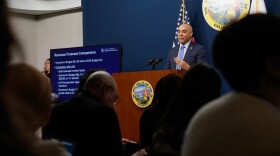The dust has settled from Tuesday's off-year elections, and now both political parties are looking forward to the next election in November 2010, when 36 governorships, 36 Senate seats and all of the House of Representatives will be at stake.
But while many agree that Democrats will lose seats next year, it's unclear how many seats they will lose.
"I'd say that the stage is set for a very strong Republican year in 2010," said Frank Donatelli, chairman of GOPAC, which supports Republican candidates. "The combination of the president's unpopularity, high unemployment [and] poor economic conditions generally give our party an opening to make major gains in Congress and the state legislatures."
They Key? Open Seats
Historically the party that holds the White House almost always loses seats in its first midterm election. When one party holds the White House, the House and the Senate, the losses tend to be bigger.
Political analyst Charlie Cook, who tracks all of the races for the nonpartisan Cook Political Report, predicts that Democrats will lose between 15 and 25 House seats — a big dent in their 40-seat majority, but not as big as the losses in 1994, when Democrats lost control of the House.
"Keep in mind that in 1994, about 40 percent of the Democratic losses of the 52 seats Democrats had were in open seats," Cook said. "So, I think the key thing is, can Democrats keep their retirements down? I would say the key variable is open seats. And the first filing deadlines start in December and January."
After Tuesday's election results, Cook changed his outlook on the Senate, moving more seats held by Democrats into the endangered column.
A Filibuster-Proof Majority
Stu Rothenberg, who tracks the midterm elections for his newsletter, The Rothenberg Political Report, agrees. Earlier this year, Rothenberg thought Democrats would hang on to their filibuster-proof 60-vote majority, but now he says a lot of that has changed because "Republican recruiting has improved."
"The Democrats are going to hold the Senate, or continue to hold a significant majority in the Senate," Rothenberg said. "But that 60 number really has been the key, although some would say that it hasn't been the key that they had hoped. Still, it is psychologically an important number. And now there's a chance that the Democrats could actually lose some Senate seats."
Although Tuesday's wins will certainly help Republicans raise money and recruit candidates, there are warning signs for the GOP, too, because Republican conservatives and moderates could be heading into a season of fratricidal warfare. That's certainly what the Democrats are hoping.
Joel Benenson, President Obama's pollster, says the three-way special election in New York's 23rd Congressional District shows what happens when conservative grass-roots activists rebel against a moderate Republican candidate. They split their vote, and the Democrat won.
"I think there's a cautionary note there for Republicans as well, particularly if you're a moderate Republican — be very careful about letting that wing of the party come in and try to push you around — because they may have paid a price for that in New York 23," Benenson said.
Passing A Health Care Bill
The White House and congressional leaders are trying to pass the president's health care bill as soon as possible so that next year they can focus almost exclusively on what voters on Tuesday said they cared about most — the economy and jobs.
But many Democrats from swing districts are more nervous than ever about following the president's lead. Obama's political adviser, David Axelrod, is trying to convince them to stay on board.
"I don't think that anybody realistically, who understands politics, can believe that the route to re-election is to run away from the path that the president is charting," he said. "I don't think that's a prescription for success."
According to Axelrod, chatter about the 1994 takeover isn't relevant, "because there were a lot of Democrats then who thought walking away from health care and walking away from the president was a way to get re-elected. And they all lost."
Many Democrats now believe that one of the reasons they lost the House in 1994 was because they didn't pass President Clinton's health care bill. Also, there's something else that's different now, Axelrod said. In 1994, the Republican Party had strong approval ratings. Today it's at an all-time low: 20 percent of voters identify themselves as Republicans.
But former Republican Rep. Tom Davis of Virginia, who used to run his party's Congressional Campaign Committee, says Republicans don't have to worry too much next year about their lousy image.
"The midterms are going to be all about Obama and the Democrats. It's not going to be about the Republicans," Davis said. "That gives the Republicans an advantage. People can vote for a Republican in the midterm, knowing they're not putting them back into power, they're just putting a check on Obama. And there is some comfort to a lot of voters."
Davis said voters often choose that comfort.
"There's a reason that over the last 60 years, three-fourths of the time we have had divided government. And that is that the public, and particularly independent voters, don't really trust either party," he said. "And they like divided government, and we get a lot of good things happen — balanced budget act, welfare reform — when you have divided government."
The appeal of a check on the majority party, added to anti-incumbent anger and a high unemployment rate, will make a very difficult election year for the Democrats.
Copyright 2022 NPR. To see more, visit https://www.npr.org. 9(MDAzMjM2NDYzMDEyMzc1Njk5NjAxNzY3OQ001))







